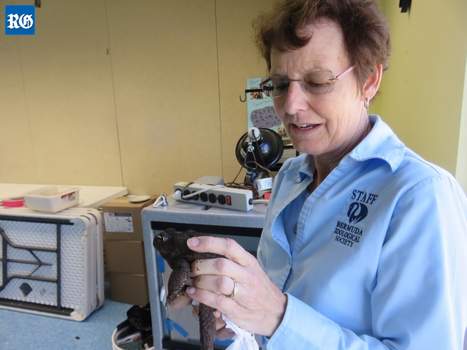Recent News
Sea turtle tangled in fishing line rescuedFriday, July 25, 2014
Efforts to protect Bermuda’s sea turtles have suffered another blow.
Bermuda Reef Life HD App Free For Android
Thursday, July 17, 2014
Fans of all things under the sea now have a new way of exploring the mysteries and wonders of Bermuda’s unique marine life as the Bermuda Zoological Society’s Bermuda Reef Life HD app is now available free for Android users
Chatterbox Preschool’s Art Auction To Aid BZS
Wednesday, July 16, 2014
Students at Chatterbox Preschool have recently been making waves in the art world, thanks to their recent studies about the ocean.
Blue Marlin donated for study
Monday, July 14, 2014
A Blue Marlin donated by the Billfish Tournament to the Ocean Vet team for research was hoisted for delivery to the Spanish Point Boat Club on July 11, with the 573 pound fish requiring a team of workers and several pieces of equipment to get it loaded and moved.
Minister Reports On State Of Bermuda Coral
Friday, July 11, 2014
In the House of Assembly today [July 11], Minister of Health, Seniors and Environment Jeanne Atherden delivered a report on the state of health of the coral reefs found in Bermuda’s waters and the Caribbean, citing the report by the Global Coral Reef Monitoring Network [GCRMN] released last week.
About
GovernanceAbout Us
Newsletter
Latest News
Gift & Bookstore
Contact
General Inquiries
info@bzs.bm
Latest News
All the latest updates and news from the Bermuda Aquarium, Museum, and Zoo, one of Bermuda's leading visitor attractions!
Jonathan Bell
Published May 10, 2018 at 8:00 am (Updated May 10, 2018 at 6:53 am)

Combination of factors: Jamie Bacon, a researcher and educator for the
Bermuda Zoological Society, looks after a toad exhibiting
deformities from pollution (Photograph by Jonathan Bell)
Bermuda’s “safest form of pest control” is under threat from water pollution, a researcher who has tracked the island’s cane toad population for about 20 years warned yesterday.
Jamie Bacon, the principal investigator for the Bermuda Amphibian Project, run by the Bermuda Zoological Society, said a fall in the toad population meant a boom for nuisances such as centipedes. Dr Bacon added: “I wouldn’t be surprised if centipedes are able to move into areas where they haven’t been before.”
She said cane toads were rare in the East End of the island, so centipedes thrived as a result.
Dr Bacon added the insects often invaded homes and can deliver a painful sting.
Dr Bacon said she had heard centipedes had appeared in new locations such as Somerset and Spanish Point, although there was no data to show the extent of their spread.
Dr Bacon, an education officer at the Bermuda Aquarium, Museum and Zoo, has spent 20 years tracking cane toad deformities caused by hydrocarbon pollution.
The BZS’s wetland research has found a variety of other contaminants — including toiletries and antibiotics that have worked their way into island ponds after being flushed down toilets.
Dr Bacon said: “It shows you that what comes out of our cesspits does not go straight down, but can move laterally in the water table.”
A combination of factors have hit the island’s cane toads, a major consumer of insects like cockroaches, which were introduced to the island in the 19th century.
The amphibians secrete poison that makes their eggs and tadpoles toxic to most predators.
But the young toads that make their way on to land are prey for birds, particularly another introduced species, the yellow-crowned night heron.
Dr Bacon said: “We’ve also lost a lot of cane toad breeding sites, so that when the cane toads in your yard die off, there are often no places nearby where toads migrate from to replace them.”
Dr Bacon added: “We don’t know yet what effects the toiletries might be causing, but we feel they aren’t having nearly the effect that we see with the hydrocarbons and metals which are at much higher concentrations.”
Cane toads, the world’s largest species, originated in South America but have been introduced worldwide to eat agricultural pests — and have become pests themselves.
Bermuda’s cane toads began to show deformities in 1998 traced to hydrocarbon pollution, which also interfered with their ability to reproduce.
The zoological society has run a wetlands remediation programme that won support from HSBC in 2014, and has cleaned up Cloverdale Pond in Smith’s and Evans Pond in Southampton. Dr Bacon warned: “This is what we’re seeing in wildlife — keep your eye on anything like this happening to people.”
Tadpoles can be collected at this time of year from toad breeding sites and raised for release into gardens, as long as there are wet places for them to take cover during the day.
Dr Bacon said medicines can be burnt or disposed of at pharmacies instead of flushing them down toilets. She added: “You can also use the least toxic pesticides that you can.”


